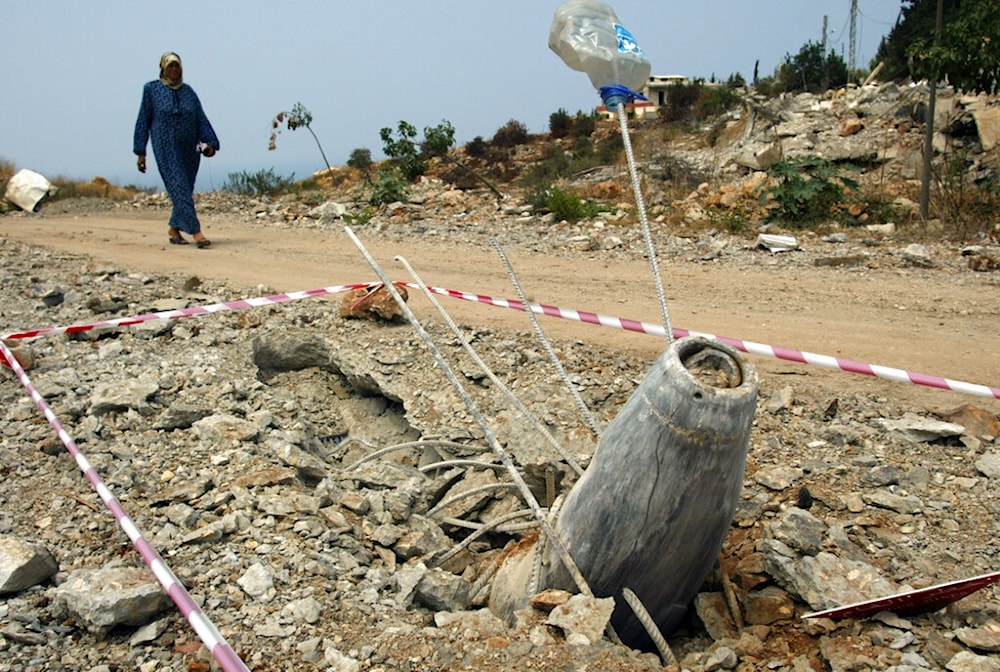Possible Israeli invasion of Lebanon to fail: The Guardian
The Guardian underlines that the Israeli occupation, were it to attempt to invade Lebanon, would fall short of meeting its goals.
-

A Lebanese woman walks near an unexploded Israeli forces' bomb, dropped during the military offensive, near the village of al-Bayyadah, southern Lebanon, on August 20, 2006 (AP)
The Israeli aggression on Lebanon is raging on, with airstrikes intensifying with each passing day and retaliatory strikes from the Islamic Resistance in Lebanon - Hezbollah not sparing any area in northern occupied Palestine.
Israeli Chief of Staff Herzi Halevi addressed Israeli troops on Wednesday, warning that if an incursion is ordered, they will face significant challenges in the well-fortified terrain where Hezbollah forces are embedded. He acknowledged that Hezbollah, backed by advanced military infrastructure, poses a formidable threat that could lead to a prolonged and bloody war.
The current situation draws stark parallels to the Israeli occupation's last attempted invasion of Lebanon, which took place during the 2006 war, The Guardian said.
During the war, the Israeli occupation forces encountered fierce resistance from Hezbollah fighters, who had prepared with combat tunnels, advanced anti-tank missiles, and sophisticated tactics that inflicted significant losses on Israeli tanks and infantry.
Halevi's speech reflected an awareness of these challenges, stating that Hezbollah had established military outposts in villages fortified with underground infrastructure and launch sites for attacks on Israeli civilians.
Despite these preparations, Halevi expressed confidence that Israeli forces are better equipped and more experienced than in the past. However, the reality of a ground invasion is far more complex than the airstrikes and drone operations the Israeli occupation has conducted so far.
The failures of the 2006 war are a cautionary tale for Israeli planners. The Winograd Commission, which reviewed the war, identified numerous flaws, including disorganized troop movements and unclear strategic objectives among the Israeli occupation forces, The Guardian said.
Israeli military leaders, including then-Chief of Staff Dan Halutz, struggled to coordinate ground operations effectively, resulting in missed opportunities and a war that fell short of its goals, as Hezbollah remained on the ground and did not fall back an inch.
Since then, the Israeli occupation forces have improved their armor and adapted their tactics to better defend against Hezbollah's mobile anti-tank weapons. However, The Guardian underlined that it remains uncertain whether an Israeli ground incursion can avoid the pitfalls of 2006 or those of previous invasions and achieve any desired objectives.
The report said it must not be ignored that Hezbollah is now better armed and more experienced, as shown through its attacks on Israeli sites in the north and through its confrontations against takfiri groups in Syria and on Lebanon's eastern borders.
Hezbollah command structure remains intact
Despite the success of Israeli airstrikes in targeting Hezbollah's command structure, the movement's core remains intact. Hezbollah's entrenchment within Lebanon's rough terrain in the south has a singular focus, which is opposing Israeli incursions. This decentralized and resilient nature has made it difficult for the Israeli occupation to deliver a decisive blow, and it is likely to keep doing so.
Adding to the Israeli occupation's challenges is the strain on its military resources. Units that have been engaged in Gaza have now been redeployed to the northern front, and the Israeli occupation continues to deal with rising tensions in the West Bank.
The ongoing war on Gaza has exposed gaps in Israeli military strategy, particularly its struggle to adapt to unconventional warfare used by non-state actors like Hezbollah and Hamas.
If history is any guide, any prospective Israeli ground incursion into Lebanon is likely to face similar obstacles as previous operations.
The invasions of Lebanon in 1978, 1985, and 2006 were marked by intense fighting, heavy casualties, and limited success in achieving long-term strategic objectives for the Israelis. It is undeniable that any future invasion could lead to similar outcomes, as Hezbollah's strength and capabilities have only increased, while the gaps shown in Gaza underline that the Israeli occupation did not gain much experience in facing decentralized, irregular groups.

 4 Min Read
4 Min Read








